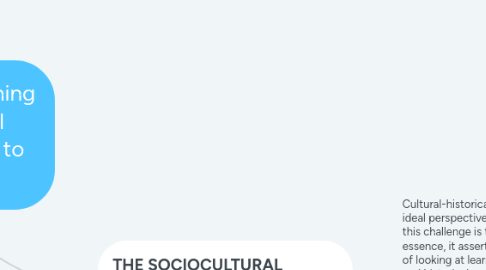
1. people learn in the procces of trying to achieve valued goals
1.1. to explore and experiment = to gain knowledge, develop skills and qualities
1.1.1. learnings often take place in the company of others = social skills
1.1.1.1. learning to learn = not only how to achieve a particular goal but how to be more effective on it = how we know and how we come to know
1.1.1.1.1. recurring contexts = dominant cultures = people belong to a variety of clubs = set of habits, attitudes and judgements = family, school, a group of friends, a profession, a workplace and a nation (cultures)
2. THE PURPOSE OF EDUCATION: TO THRIVE ON UNCERTAINTY
2.1. should = education is essentially a moral enterprise = maps out courses of learning that are designed to give people knowledge, skills, attitudes and qualities
2.1.1. Educators = making value judgements about what kinds of minds people need, and how they should be cultivated
2.1.1.1. the doctor = to know about anatomy and pharmacology = to treat and prescribe
2.1.1.2. the attorney = to know about laws, rhetoric and billing.
2.1.1.3. but the education of the young, is the based on which all such specialized learning will be built = it has to have goals = broader and deeper
2.1.1.3.1. school = to equip young people with the knowledge, capabilities and dispositions = they will need to cope well in the world as adults = cope well varies enormously within and between cultures
3. THE SOCIOCULTURAL APPORACH TO LEARNING: A TALE OF THREE DISCOURSES
3.1. Cultural-historical activity theory (CHAT) = ideal perspective form which to see how this challenge is to be met, for, in essence, it asserts the crucial importance of looking at learning in its social, cultural, and historical context
3.1.1. three discourses within learning and development
3.1.1.1. individual-developmental discourse of psychology
3.1.1.1.1. the individual person is viewed as a constellation of knowledge structures, skills, habits, attributes, attitudes, beliefs, qualities and dispositions
3.1.1.2. social-historical of sociology, anthropology, political theory and the other macro-social sciences
3.1.1.2.1. the changing nature of socal structures and institutions, of deliberate policies and implicit cultural practices. power, ritual, dissident sub-cultures, risk society, social exclusion.
3.1.1.3. irreducible situated moment or mediated action (Wertsch, 1995)
3.1.1.3.1. asserts that the categories of the first two discourses (being abstractions and tendencies)are in principle never able fully to catch the intricate complexity of the unique moment in which a person interacts with and unprecedented material, social and cultural setting
3.2. To describe the progress that is made, as a result of such interactions = set of valued educational goals, we need the language of psychology.
3.2.1. Cultural-historical activity theory starts form and works with the insight that these three discourses are simultaneously legitimate and essentially and valuably complementary
4. THE LAYERS OF CULTURE
4.1. one can explore the relationship between culture and learning at any level, from the global, to the directly interpersonal, to the solo individual trying to make sense of some cultural practice or material artifact
4.1.1. the momentary interaction between a teacher and a student = is imbued with influences from the classroom culture, the culture of the subject discipline, the school, the community, the nation and the changing nature of international politics and economics, as well from the home cultures and histories of the individuals concerned.
4.1.1.1. contemporary sociocultural theorist = neglect the wider political dynamics of the individual family or classroom, especially the adult-child dyad and the local characteristics of zones of proximal development
4.1.1.1.1. the values and assumptions of the wider cultures impact on the classroom in multiple ways: through its espoused goals, forms of assessment, social organization, roles and rituals, the language of the teacher's commentary, the materials supplied and the opportunities for learning they afford
4.2. RESILIENCE
4.2.1. key qualities of the effective real-life learner = the ability to stay intelligently engaged with a complex and unpredictable situation
4.2.1.1. resilient individuals will be more inclined to take on learning challenges of which the outcome is uncertain= to persist with learning despite temporary confusion or frustation and to recover from setbacks and failures
4.2.1.1.1. the opposite = fragility = the tendency to get upset and withdraw at the first sign of difficulty
5. RESOURCEFULNESS
5.1. individuals internalize the cognitive and linguistic tools they are offered by their epistemic milieux = they also make continual intelligent use of the resources that are afforded by their current environment.
5.1.1. they capitalize on found assets and "off-load" cognitive effort (both individually and collectively) by exploring facilities and creating artifacts (notebooks, computers and filing cabinets) that shoulder some of the computational or mnemonic load
5.1.1.1. environments afford resources = they do not become functional aids to intelligent learning unless they are perceived as such by the learner
5.1.1.1.1. Gibson (1979) = evolution has built into the human perceptual apparatus some of these senstivities (small babies seem to know that a looming shape is probably an approaching object) but many of our useful "affordances" have to be discovered
6. TIME AND OPEN-MINDEDNESS
6.1. the way in which teachers, as learners relate to educational change
6.1.1. Andy Hargreaves (1994) = distinction between two different cultural apporaches
6.1.1.1. the monochronic
6.1.1.1.1. taks are clearly defined and tackled sequentially accordint to a predetermined timetable = clear sense of the kinds of interactions between peole that are "on task" and those that are not
6.1.1.2. the polychronic
6.1.1.2.1. tasks are routinely tackled in a complex, paralle fashion without hard and fast deadlines. social and instrumental interaction are interwoven and informal, often emerging organically and opportunisticlly
